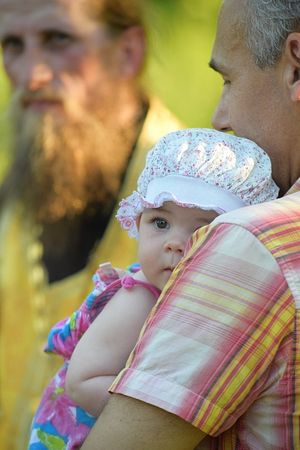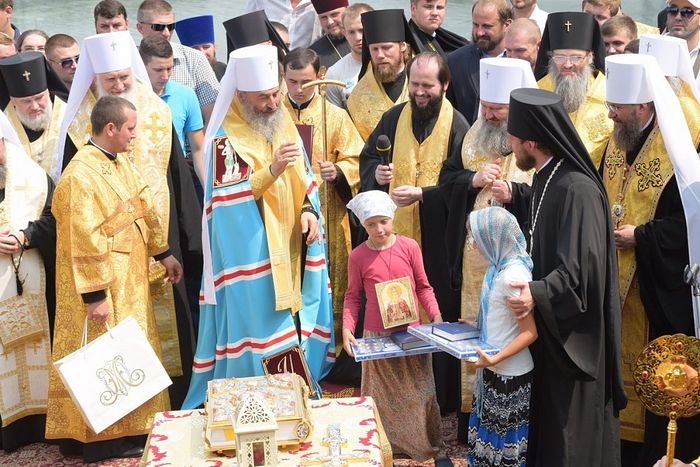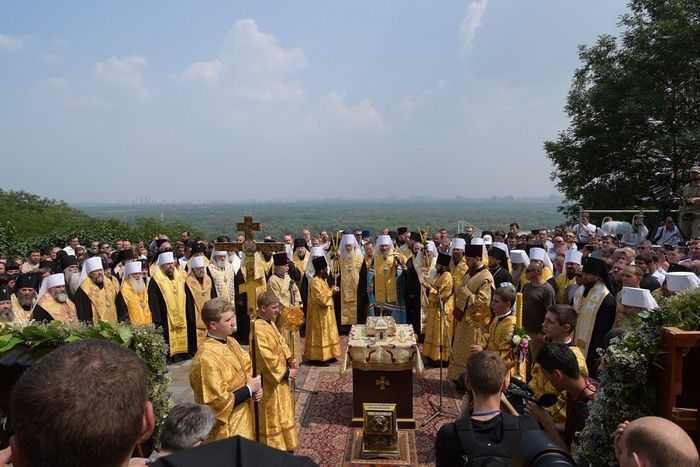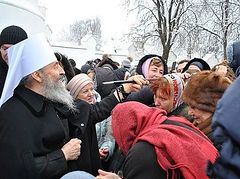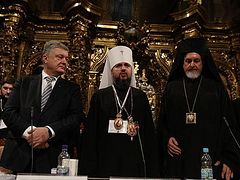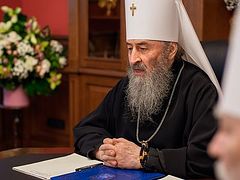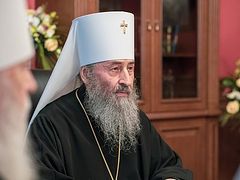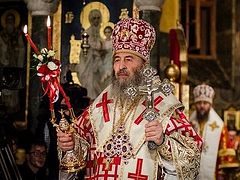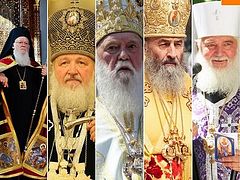“Tell me, how do you relate to people of the older generation?”
“Well, with respect.”
“Are there not among them two people whom you relate to especially well, for example, who you regularly call, you take an interest in their health, you help them financially, and ask for their advice?”
“Yes, that would be my parents.”
“How would you react to the suggestion to renounce your mother?”
“Negatively.”
“Why?”
“It’s repugnant to forget about those who gave you life, who raised you, who nurtured you, and who sent you off into adulthood.”
“How do you feel about such people?”
“I despise them.”
I could have approximately such a conversation today with someone who would suggest that I leave the canonical Ukrainian Orthodox Church (UOC) for the newly-created structure entitled the Orthodox Church in Ukraine (OCU).
For me, the UOC is the Church where my children and I were baptized, where I got married, and which buried my mother and other loved ones. For me, the UOC is my spiritual mother, but now they’re suggesting that I renounce it. Why? It turns out, it’s not the right nationality and it teaches me bad things.
As for nationality, I want to say that since 1991 the canonical Orthodox Church in Ukraine has been precisely Ukrainian, and nothing else. It doesn’t have priests “sent” from outside; they were born in this land and serve in the Church Slavonic language of the Church of the Equal-to-the-Apostles Prince Vladimir, whose inheritor the UOC is. The clergy communicate with their flocks in the language of the parishioners, and those who think it’s only in Russian don’t even remotely understand the whole ethnic diversity of Ukraine. The priests preach in Romanian, Bulgarian, Polish, Hungarian, in the Romance languages, and even in Greek.
According to all the official documents, the canonical Orthodox Church is not the UOC-MP, but the UOC. The suffix MP [Moscow Patriarchate—Trans.] was invented by journalists as the first step towards discrediting it. Since 1992, the UOC has been completely independent in its organizational, personnel, and economic activities and connected with the Russian Orthodox Church (ROC) canonically, namely through receiving Chrism, internal Church communication, and the veneration of common saints.
I’ll say more: It’s not the ROC that influences the UOC, but the opposite, inasmuch as the representatives of the UOC participate in the sessions of the Holy Synod of the ROC and can influence its decisions but no representatives of the ROC participate in the work of the Holy Synod of the UOC, and, therefore, cannot regulate its activities.
The truth is that today the UOC is the only Orthodox Church that preserves not only hypothetically but also practically the statehood of Ukraine with its 2013 borders, as the dioceses in Donbass and Crimea are part of the UOC. The truth is that of all the Christian confessions, the UOC is the most independent, as the Ukrainian Catholic and Ukrainian Greek Catholic churches submit to the Pope of Rome, the administrative centers for the Protestants are scattered all across the world, and the newly-created OCU will be subject to Istanbul.
There simply is no more Ukrainian church than the UOC, so there is no “Russian Church” and “Russian priests,”1 and whoever says so is a criminal, pitting Ukrainians against themselves for the sake of personal gain. And those who are caught up in this are either fools or Russophobes.
Now, about what our Church teaches:
“Citizen Gorbushkin, we have invited you as a witness in the case of a certain Schukin. What can you testify to us as a witness in this matter?”
“I can testify everything as a witness in this case.”
“Very good, and how long have you known Schukin?”
“I don’t know Schukin at all.”
“So, in that case, what can you testify in this matter?”
“Everything. Anything you want.”
This was written by Mikhail Zoschenko 78 years ago. Today this dialogue would sound like this:
“What can you testify to us against the UOC?”
“I can testify everything against the UOC.”
“Very good. And how long have you been going to the UOC?”
“I don’t go to the UOC.”
“So, in that case, what can you testify against the UOC?”
“Everything. Anything you want.”
People today accusing my Church of anti-state activities, of supporting terrorism, of inciting ethnic hatred, of praying for an “aggressor” state, its leader, and armed forces, of taking “Moscow poison from the Moscow cup,” don’t go to it. Some of them are from other religions, some are atheists, some are explicit theomachists, but none of them have any idea of who and what we pray for, although that doesn’t prevent them from testifying everything against us. Anything you want.
There’s a war now in Ukraine, people are dying, but our Church calls for peace, as it sees every person who dies in Donbass as a Ukrainian—that’s our Ukrainians, that’s our unformed families and children not born by them. And the vast majority of people want peace, not war, don’t they?
The country is wallowing in corruption and thievery. Everyone knows you can buy anything for money, including justice. But our Church places spiritual values immeasurably above material values. Is that really a bad thing?
The country is rapidly dying out, we have abortions like an assembly line, cohabitation has become the norm, HIV/AIDS is spreading across the country like ripples on the water from a stone tossed into it, but the Church teaches abstinence and marital fidelity and it condemns abortion and cohabitation. Or maybe, who cares about this demographic that could soon erase Ukraine from the world map anyways?
What’s wrong with the Church weaning me from fornication, taking bribes, cursing, slandering, and welcoming abortions? If someone became better, does society really become worse for it? I’ll say this: Whoever truly wants to know what is on our mind, let them go to any of our churches and be assured that the UOC cares not for its material and political benefits, but for the salvation of human souls and for the cleansing of society from the vices that destroy the foundations of the state.
It cannot be otherwise, because it is precisely our Church that is the Mother for Ukraine, as Kievan Rus’ as a state took place only after its Baptism into Orthodoxy. It was our Orthodox Church that throughout its entire history has raised its children, helped them defend themselves from enemies, reconciled and united them in troubled times, and revived statehood itself. It was with us in troubles and in joys. It was with us when we, considering ourselves adults, stopped listening to it. It was with us when we debased and oppressed it. It stayed with us even when we, after the October Revolution, started to kill it—publicly and behind its back, consciously and methodically, savoring the details and reveling in the blood. It forgave us everything, as a mother forgives everything to her dissolute son, because love and forgiveness are its foundation stones.
Today, the Orthodox Church is once again being led to Golgotha, and we, its sons, are offered to join those who, in a nationalist frenzy, demand from the God-fighting authorities: “Crucify it, crucify it!”
In Dostoyevsky’s Demons, the ruling hierarch says: “Satan takes on the face of an angel of light.” The idea of creating a united Local Orthodox Church in Ukraine has become this angel of light that people are reaching for. On the one hand, you can understand them—we’re talking about our own Church, dependent on no one, but on the other hand, they’ve been deceived again. The new Church is not united, as the canonical UOC did not join the union with schismatics. It’s not Local, as it canonically and organizationally accepted dependence on the Phanar. With the seizure of the UOC cathedral in Vinnitsa already on the day of the so-called “unification council” in favor of the turncoat Simeon, it, in essence, ceased being Orthodox, as it violated the tenth commandment: Thou shalt not covet thy neighbour's house. That is why, despite the invitations sent out, not a single Local Orthodox Church sent any representatives to the event on December 15.
Let us recall the prophetic words of Dostoyevsky: “The shopkeepers and merchants will carry out the revolution by the hands of the romantics.” Recall how the shopkeepers and merchants deceived the romantics at the Maidan, promising a bright European future and plunging them into poverty and turmoil. Today the same Maidan is being realized, only with a religious bent. It’s the same goal—independence and prosperity. It’s the same enemy—external and internal. It’s the same audience—patriots and romantics. And it’s the same leaders—shopkeepers and merchants. Therefore, I would answer the suggestion to enter the newly-created structure with the question: “How would you characterize, in one word, a man who betrays his Mother?”


